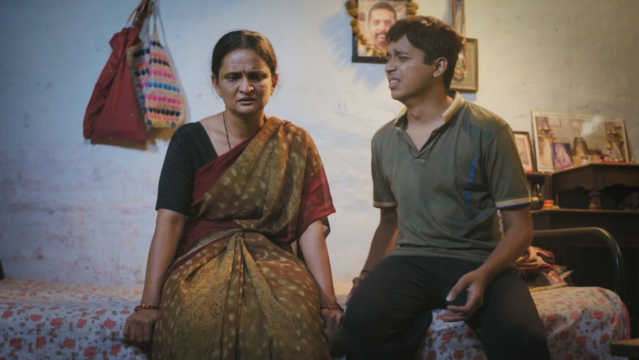
Mayur Lookhar
Mumbai, 17 May 2018 13:11 IST
Updated: 18 Dec 2018 14:48 IST
Director Sagar Vanjari’s endearing drama of a poor man’s obsession with his radio is a laughter fest worth tuning in to.

They say everything in life happens for a reason. But it is hard to accept this philosophy when you lose someone or something precious. Thus, I began hyperventilating when I discovered at the International Film Festival of India in Goa last November that my expensive branded earphones were missing. There were less than five minutes left for the Redu screening to begin, but my decision was made. I rushed back to the media centre, the last place I remembered using the earphones. Fortunately, they were still lying where I had left them.
Grabbing the earphones, I rushed back to the movie hall and couldn't believe my luck. The feature presentation had not yet begun. I was sweating profusely from the exertion of the past five minutes, but I was also hugely relieved. And, as it happened, the scare helped me appreciate the film far more than I might otherwise have.
Set in 1970, Redu tells the story of Tatu (Shashank Shende), a poor labourer from rural Maharashtra who constantly quarrels with his hardworking wife Chhaya (Chhaya Kadam). He is often irate, cribbing about his miserable life, has no interest in working, and no goal in life.
Tatu isn’t amused when Chhaya tells him that her sister Suman (Gauri Konge) and her husband Baban (Vinamra Babhal) will be staying with them for a few days. Tatu despises his brother-in-law. He hopes his taunts will make the guests leave quickly.
Suman and her well-to-do husband bring with them a radio. Tatu’s eyes light up at the sight of the 'redu', just like a child's on seeing a lollipop. At first, he wonders what devilry it is, but once he figures out its utility, the redu becomes a life-changing drug, a source of great entertainment.
Seeing Tatu’s love for the radio, Baban decides to gift it to him. The poor man’s joy knows no bounds. This gadget changes his life. A man who was the most disliked person in the village now sees his social status elevated, all because he possesses a radio. He also starts talking sweetly to his wife and neighbours.
Sadly, Tatu’s joy is short-lived as the radio is stolen. The distraught Tatu vows to find it at any cost.
Sanjay Navgire’s original screenplay and story was adapted into the Malvani dialect by Chinmay Patankar. Director Sagar Vanjari then turned out a highly engaging screenplay.
As the opening credits roll, you see a reflection of each credit in the water. Quite an innovative way devised by the post-production team. From this moment on, you sense that this could be an altogether new visual experience.
Cinematographer Mangesh Gadekar captures some breathtaking views of the Konkan belt. The interiors of Maharashtra are characterized by its laterite red soil. When it rains, the soil bears a rich distinct look, and the petrichor uplifts your spirit. Gadekar, born in the Satara district, brings this red horizon to the screen.

Baban and Suman cruising in a green valley, Tatu and Chhaya frantically running in the fields (both bird's eye view shots) and Tatu digging a well are scenes pleasing to the eye. Early in his career, Gadekar shows that he has an eye for amazing shots, and creating the right atmosphere for a scene.
Redu is visually appealing, but it is the characters and performances that leave an indelible mark. In Tatu and Chhaya, director Vanjari creates such endearing, earthy characters. Be it their quarrels or even Tatu farting, the humour is not forced. It comes naturally to Shashank Shende and Chhaya Kadam who play rustic, impoverished characters. The quarrels aside, Tatu shows his sensitivity as he plucks a thorn out of Chhaya's foot in one scene.
The character graph is such that Tatu exhibits various emotions. A frustrated, crude man to begin with, the radio helps to turn him into a happy soul. But once it is lost, the agony turns him into a man possessed. Tatu’s emotions are like different frequencies in a radio. Shashank Shende chips in with an intense, virtuoso performance.

Chhaya Kadam matches Shashank Shende’s intensity and delivers a powerful performance of her own. Her husband is going crazy, he even walks on burning coal, but his wife Chhaya stands like a rock behind Tatu. After an explosive yet understated performance in Nude (2018), Chhaya Kadam plays her part to the T in Redu.
Vinamra Babhal is the true joker here. His colourful clothing, fancy hat, and goofy and impish sense of humour make him a lovable character. Back in Mumbai, he is an ordinary government employee, but he is hailed as an achiever in the village. Baban is not arrogant, but it is hard for him to ignore the flattery by Tatu and the villagers.
His banter with Tatu is filled with hilarious moments. Baban and Tatu’s shenanigans after a drink are amusing. Tatu is overly protective of the radio. Tatu senses a thief in the house, and manages to catch him. However, it is just a dream and Tatu wakes up realizing that he is actually choking Baban.

Much of the humour fades when Tatu loses his radio. There is no drop in the intensity of the screenplay, though.
Gauri Konge is impressive as Chhaya’s sister Suman. You wish you could see more of her and Vinamra Babhal, but there is limited scope. Child actress Mrunmayi Arun Supal, too, deserves praises for her innocent show as Tatu and Chhaya’s daughter Saru. While Tatu is obsessed with his radio, little Saru loves her kombdi (chicken). A thief steals both. Saru’s affection towards the chicken is so pure, and the kind of tender moment that sometimes does not get much mention.
A gripping story, neat screenplay, fine performances and brilliant cinematography make Redu a thoroughly entertaining film. The film could have been great if not for the climax that bears resemblance to a 1996 children’s film.
Leave everything behind, and tune into Sagar Vanjari’s Redu.
Redu was screened at the 48th International Film Festival of India in Goa in November 2017 in the Indian Panaroma section. It will be screened again at the Habitat Film Festival at New Delhi's India Habitat Centre on Saturday 19 May 2018 at 7pm.
Related topics
IFFI Habitat Film FestivalYou might also like

Review Marathi
Samaira review: This well-intentioned travel drama suffers from a dull script
Actor Rishi Deshpande's directorial debut doesn't rise as much as its performances. ...

Review Marathi
Goshta Arjunchi review: Triggering conversations about mental health
Anupam Barve’s short film urges people to talk to their families about what they are going...

Review Marathi
Ekda Kaay Zala review: Sumeet Raghvan impresses in a film that does not use its full potential
Directed by Dr Saleel Kulkarni, the film has a fine act by child artiste Arjun Purnapatre....

